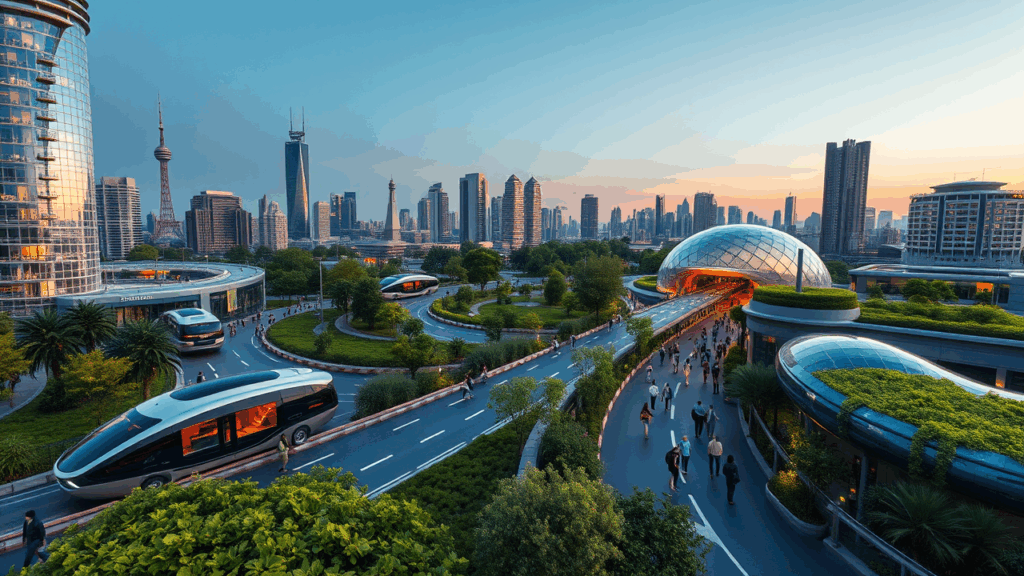# The Future of Travel: Real-Time Metrics and Sustainable Journeys by 2040
## Embracing Real-Time Travel Metrics: A New Era of Accountability
Imagine a world where every step you take abroad is monitored, measured, and optimized — not just for convenience or enjoyment, but for the planet. This is the exciting future predicted for the travel industry, driven by advancements in technology that make real-time tracking of travel metrics a standard feature by 2040. Through sophisticated apps, wearable devices, and integrated systems, travelers will gain the ability to log their daily emissions, assess their environmental footprint, and make more responsible choices on the go.
## How Technology Will Shape Travel Accountability
Currently, the travel industry is on the cusp of a transformative shift. By 2028, the global travel technology market is expected to hit a staggering £11.2 billion, up from £7.3 billion in 2022. This surge reflects the growing demand for innovative solutions that combine travel convenience with sustainability.
Travelers will no longer rely solely on static carbon calculators—those that estimate emissions upon trip planning—but will instead engage with dynamic, real-time platforms. Imagine your smartphone or wearable device constantly monitoring the amount of CO2 emitted during your flight, train ride, or even your hotel stay. These tools will provide immediate feedback, encouraging travelers to adjust their behaviors — perhaps opting for greener transportation options or choosing accommodations with robust sustainability practices.
## The Role of Travelers in the Sustainability Movement
The vision for 2040 sees travelers as active participants in environmental stewardship. Past generations often felt disconnected from the environmental impact of travel; today, and increasingly in the future, travelers will be empowered to hold themselves accountable. With transparent, real-time data at their fingertips, many will strive to meet personal carbon budgets, similar to how one might track daily calorie intake.
This shift isn’t just about individual responsibility—it’s about fostering a community of “Travel Transformers” and environmentally conscious cohorts committed to reducing their global footprint. Through social sharing of metrics, travelers can motivate each other, creating a ripple effect that amplifies sustainable practices across the industry.
## Noteworthy Advances and Innovations Today
While the vision for 2040 sounds futuristic, key developments are already paving the way. Companies are experimenting with blockchain for transparent, immutable logging of travel data — making emission tracking trustworthy and accessible. AI-powered analytics assist travelers in exploring greener options, suggesting eco-friendly routes, accommodation, and activities based on real-time environmental data.
Moreover, some airlines and hotels are integrating sustainability metrics into their loyalty programs, rewarding eco-minded travelers with points or discounts when they choose low-emission transport modes or stay at eco-certified properties.
## Looking Ahead: The Transformation of Travel Culture
By integrating environmental metrics into the fabric of travel, the industry is moving toward a more transparent, accountable, and ultimately responsible model. As technology continues to evolve, expect to see sophisticated dashboards that visualize your carbon footprint while suggesting meaningful ways to improve.
This not only benefits the planet but enhances the travel experience—making journeys more mindful and meaningful. In the future, traveling won’t just be about visiting new places; it will be about doing so thoughtfully, with an eye toward sustainability and global stewardship.
## Final Thoughts
The road to 2040 is paved with innovative solutions that will revolutionize the way we travel. Real-time measurement and transparency will become integral to responsible tourism, encouraging travelers to embrace sustainable behaviors. As we march towards this future, one thing is clear — technology will be our greatest ally in creating a cleaner, greener, and more accountable world of travel.
Stay curious, stay responsible, and happy exploring!
—
# Navigating the Booming Travel Tech Market: Key Trends for 2028 and Beyond
## The Rapid Rise of Travel Technology Market
The global travel technology market is experiencing unprecedented growth, projected to reach £11.2 billion by 2028 from £7.3 billion just in 2022. This robust expansion underscores how vital technology has become in shaping our travel experiences, making them smarter, more sustainable, and more personalized than ever before.
## Why Is Travel Technology Growing So Fast?
Several factors fuel this explosive growth. The increasing demand for seamless connectivity, personalized experiences, and eco-conscious travel options all contribute to a vibrant market ripe for innovation. Travelers are seeking apps and platforms that provide real-time data, streamline bookings, and help them make decisions aligned with their environmental values.
Emerging technologies like Artificial Intelligence (AI), Blockchain, and Internet of Things (IoT) are at the forefront of this revolution. They enable smarter travel planning, automated check-ins, personalized recommendations, and, crucially, tools to track and reduce carbon footprints.
## Key Technologies Shaping the Future
### 1. Real-Time Emission Tracking Apps
Imagine apps that monitor your journey’s emissions in real time, giving you immediate feedback on how your choices impact the environment. This transparency motivates eco-friendly behaviors, like choosing train over plane or staying at green-certified hotels.
### 2. Blockchain for Transparency
Blockchain ensures trustworthy logging of travel data—making emission calculations verifiable and immutable. This is vital for travelers who want precise, reliable data to measure their environmental impact.
### 3. Personalized Sustainability Recommendations
AI-driven systems analyze your travel habits and preferences to suggest greener options. Whether it’s routing through eco-friendly airports or recommending sustainable accommodation, these insights empower travelers to make better choices.
### 4. Smart Loyalty Programs
Hotels and airlines are integrating sustainability metrics into their loyalty schemes. Rewards for eco-conscious behaviors incentivize travelers to think more sustainably during their journeys.
## The Impact of Market Growth on the Travel Industry
The expanding market fuels innovation, creating new opportunities for startups and established players alike. Travel companies investing in green technology will differentiate themselves, attracting environmentally aware consumers. Moreover, governments and regulatory bodies are increasingly emphasizing sustainability, prompting industry-wide shifts.
## How Travel Tech Will Reshape Our Experience
In the near future, your travel planning will be increasingly data-driven. Expect dashboards that visualize your carbon footprint, suggestions for greener routes, and real-time notifications about the sustainability impact of your current journey.
This technological sophistication will make sustainable travel not just an option but the default. Travelers will be better equipped to minimize their footprints without sacrificing convenience or comfort.
## Looking Ahead
As the travel tech market continues to expand, expect continuous innovation in sustainability solutions. Integration between devices and platforms will become seamless, making eco-conscious choices effortless. The next wave of travel technology promises a smarter, greener future—one where the journey itself contributes positively to the planet.
Stay tuned to this exciting evolution, and consider how you can leverage these technologies to travel more responsibly.
—
# How Real-Time Travel Data Will Revolutionize Eco-Friendly Tourism
## The Power of Live Data in Travel
Imagine flying, staying in a hotel, or exploring a city, all while knowing precisely how much your journey impacts the environment — and having the tools to influence that impact in real time. This is no longer science fiction; it’s the anticipated reality by 2040, as live tracking of travel metrics becomes commonplace.
## Why Real-Time Data Matters
Traditionally, travelers and industry players relied on estimates of carbon footprints after trips concluded. However, this approach misses opportunities for immediate correction and behavioral change. Real-time data enables travelers to see the immediate effects of their choices—encouraging environmentally conscious decisions during the journey itself.
## Applications of Real-Time Tracking
### Emission Monitoring During Travel
Smart devices can monitor emissions from flights, car rides, and accommodation energy use. For instance, a traveler could check a personal dashboard showing their current trip’s carbon emissions, compare it to their daily or weekly targets, and adjust accordingly.
### Sustainable Decision-Making On the Fly
When faced with options — choosing between a direct flight or a layover, or selecting a rental car or a bicycle — real-time data can tip the scales. Not only do travelers gain awareness, but they are also empowered to act responsibly.
### Feedback Loops and Incentives
Hotels and airlines might reward travelers with discounts or points for reducing emissions during their stay, tracked via integrated systems. Such incentives reinforce sustainable behaviors and build a culture of eco-conscious travel.
## Industry Innovations Currently Setting the Stage
Some pioneers in the field are already experimenting with these concepts. Blockchain-based emission logs, apps that provide live carbon scorecards, and AI systems suggesting greener options are proof of the trend’s momentum. For example, airlines offering real-time emission data during booking or onboard are setting new standards.
## The Cultural Shift Toward Responsibility
In 2040, travelers will see themselves as stewards of the environment. Having immediate feedback on how their actions influence the planet will foster greater responsibility and a shift towards more sustainable tourism practices. It’s a move from passive travel to conscious exploration.
## The Future of Travel: An Integrated Ecosystem
Imagine a future where your travel app, wearable device, and hotel systems communicate seamlessly, providing a holistic view of your journey’s environmental impact. You could receive notifications about how to offset your emissions or suggestions for greener activities at your destination.
This integrated ecosystem will make sustainable travel accessible, intuitive, and even enjoyable.
## Concluding Thoughts
The advent of real-time travel data is set to revolutionize eco-friendly tourism. No longer will travelers have to rely on post-trip calculations or vague estimates. Instead, they will be empowered with the information necessary to make immediate, meaningful choices—transforming travel into a force for good.
As technology evolves, responsible travel will become ingrained in our journeys, ensuring that exploring the world leaves a positive mark, not a carbon trail.
—
# Sustainable Travel and the Rise of Eco-Conscious Travelers
## The New Face of Tourism: Environmentally Aware Journeys
As the climate crisis intensifies, travelers increasingly prioritize sustainability. The landscape of tourism is shifting, with eco-conscious travelers seeking destinations, accommodations, and transportation options that align with their environmental values. By 2040, this mindset will define a significant segment of the global travel market, reshaping industries and influencing policy.
## The Role of Technology in Supporting Sustainable Journeys
Technology is an enabler of this transformation. From apps tracking individual emissions to platforms recommending eco-friendly activities, travelers now have a multitude of tools to align their behavior with their environmental principles. The travel technology market’s rapid growth reflects this demand, predicted to hit over £11 billion by 2028.
### Key Technologies Benefiting Eco-Conscious Travel
– **Emission Tracking Tools:** Real-time apps that allow travelers to log emissions during their trip and see their environmental impact instantly.
– **Green Certification Platforms:** Databases that certify hotels and tour operators adhering to sustainable practices.
– **Smart Routing and Transportation:** AI systems suggesting the lowest emission routes or eco-friendly transport options such as trains or bicycles.
– **Loyalty and Incentive Programs:** Rewards for choosing greener options, encouraging behavioral change.
## The Psychology of Responsible Travel
Today’s travelers see themselves as participants rather than passive visitors. They are motivated by a desire to contribute positively to the places they visit. Real-time data reinforces this responsibility, turning environmental consciousness into an achievable and even enjoyable aspect of travel.
Many travelers will set personal sustainability targets—tracking, optimizing, and celebrating their achievements. Social sharing of their eco-metrics will foster communities that value and promote responsible tourism.
## Industry Changes Driven by Eco-Travelers
Hotels, airlines, and travel services are increasingly integrating sustainability into their offerings. For example, loyalty programs now reward eco-friendly choices, and industry standards are emphasizing transparency and verifiability of sustainability credentials.
Emerging innovations include blockchain for transparent emission data and AI-powered personalization for greener choices. These changes are making sustainable travel more accessible, affordable, and appealing.
## Preparing for a Sustainable Travel Future
Looking ahead, the focus will shift not only to mitigating environmental impact but also to actively restoring ecosystems through travel. Eco-tourism will be mainstream, with travelers seeking immersive experiences that support conservation and local communities.
As an individual traveler, you can begin by exploring ethical destinations, supporting green-certified providers, and leveraging technology to track and reduce your carbon footprint.
## Final Reflection
The future of travel is bright and responsible. With technology facilitating transparency and accountability, every journey can become a step toward environmental preservation. By embracing sustainability today, we lay the foundations for a more conscious, compassionate way to explore our beautiful world in the decades to come.


